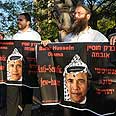
Obama welcomes Netanyahu's two-state speech
White House praises prime minister's speech as 'important step' forward, president 'believes this solution can and must ensure both Israel's security and the fulfillment of the Palestinians' legitimate aspirations for a viable state'
WASHINGTON - The White House is welcoming Prime Minster Benjamin Netanyahu's call for the creation of a Palestinian state. Netanyahu said in Jerusalem that he would support a Palestinian state as long it is demilitarized and guarantees Israel's security.
White House spokesman Robert Gibbs said Sunday that US President Barack Obama welcomes the
speech and is committed to two states: a Jewish state of Israel and an independent Palestinian state.
Gibbs says Obama will work with all parties to see that they fulfill their obligations and head toward regional peace.
Full Coverage:
- Likud hardliners slam 'soft' speech
- Palestinians: Netanyahu sabotaging peace
- US 'welcomes important step forward'
"The President welcomes the important step forward in Prime Minister Netanyahu's speech. The President is committed to two states, a Jewish state of Israel and an independent Palestine, in the historic homeland of both peoples," Gibbs said.
"He believes this solution can and must ensure both Israel's security and the fulfillment of the Palestinians' legitimate aspirations for a viable state, and he welcomes Prime Minister Netanyahu's endorsement of that goal.
"The President will continue working with all parties - Israel, the Palestinian Authority, Arab states, and our Quartet partners - to see that they fulfill their obligations and responsibilities necessary to achieve a two-state solution to the Israeli-Palestinian conflict and a comprehensive regional peace."
Speaking at the Begin-Sadat Center for Strategic Studies at Bar Ilan University on Sunday, Netanyahu
endorsed the creation of a Palestinian state that would exist alongside Israel.
However, Netanyahu repeatedly stressed, any such entity must not be armed. "The territory under Palestinian control must be demilitarized with ironclad security provisions for Israel," the prime minister said.
"If we receive this guarantee regarding demilitarization and Israel’s security needs, and if the Palestinians recognize Israel as the State of the Jewish people, then we will be ready in a future peace agreement to reach a solution where a demilitarized Palestinian state exists alongside the Jewish state," he said.
'Settlements? That's their problem'
Meanwhile a senior official from Netanyahu's office said later on Sunday evening that he was not concerned about the US reaction to the prime minister's decision not to discuss a freeze on settlement construction or plans to dismantle illegal outposts in the West Bank.
"It's their problem," the official said, adding that the Americans have a problem "if they cannot understand that we can't hurt those communities. They are out brothers, our flesh and blood. A senior American official told me once that as long as we took care of one another here, America would take care of us from there. Well, that is that we have to do. Our attempt to evacuate the settlements in Gaza was a failure."
One of the prime minister's closest aides acknowledged however that Netanyahu's endorsement of a Palestinian state would not bode well with the hardliners in his party. In May 2002 he defeated then-Prime Minister Ariel Sharon in the Likud when Netanyahu proposed the party object to the establishment of a Palestinian state west of Jordan. His proposal received an overwhelming majority of votes within the party.
"It's clear that the prime minister has taken a bold step that will anger many in the Likud," the aide said, "but these are steps that a leader must take."
Several European ambassadors who attended the speech also said they viewed the shift in policy as positive. One said however that the failure to announce a freeze on the settlements may prove to be an obstacle to peace.
"The prime minister spoke the truth – and it's hard to argue with the truth, even for the Obama
administration. On the one hand the prime minister made a brave move in talking about a demilitarized Palestinian state. On the other hand, he made clear what the limitations would be to its creation," an official in Netanyahu's office said, summing up the address.
"He talked of peace, but emphasized that we will not compromise on security, on Jerusalem or on the return of Palestinian refugees to Israel. He stressed Israel's right to demand the Palestinians recognize Israel as a Jewish nation. And beyond the willingness for peace, the prime minister also spoke the truth on our commitment to the settlers in the larger settlement blocs and in general. That is exactly what Israel's leader should say at a time like this."
Roni Sofer contributed to this report










